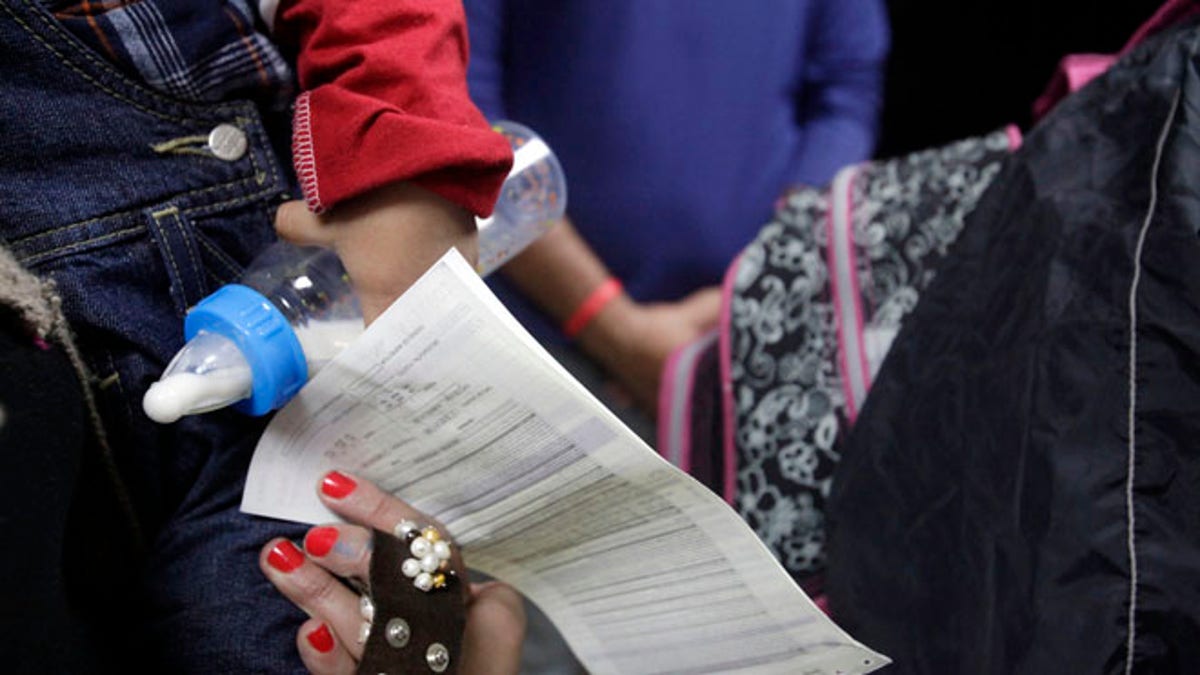
In this Dec. 1, 2011 file photo, a Guatemalan boy who was found in the Mexican desert is shown arriving at the international airport in Guatemala City. (Reuters)
The number of children caught crossing the U.S.-Mexico border has surged over the last two years, raising questions about whether the Obama administration's changing immigration policies are creating a magnet.
Statistics released late last week show 24,668 "unaccompanied alien children" were placed last year in the care of the federal agency that, by law, is responsible for them. That's nearly double the number from 2012, and nearly quadruple the number in years past.
As is often the case with immigration statistics, it's unclear what is driving the increase. The surge could be driven in part by better enforcement, and immigration officers doing a better job catching border crossers.
But critics point to other factors. A federal judge in Texas claimed earlier this month that the Department of Homeland Security has been delivering children smuggled across the U.S.-Mexico border to their illegal immigrant parents. In June 2012, the administration decided to give a reprieve to young illegal immigrants who came to the U.S. as children.
Though the latter would not apply to people who just arrived, critics say these policies send a clear message south of the border: The rewards of trying to cross into the U.S. outweigh the risks.
Chris Crane, who heads The National ICE Council immigration officer union, said agents are being "overrun" with children crossing the border.
"We can't keep up with it," he said.
According to the Office of Refugee Resettlement, most of the minors come from Central America -- largely Guatemala, El Salvador and Honduras.
The stats show a big spike over the past two years. The office recorded an "unprecedented increase" in 2012, with the number jumping from an average of 6,775 to 13,625.
The numbers refer to children who are intercepted by the Department of Homeland Security. Under federal law, many of those children are transferred to the Office of Refugee Resettlement, within the Department of Health and Human Services.
They are supposed to be entered into immigration proceedings, though Judge Andrew Hanen questioned whether this was necessarily happening, particularly in cases where minors were reunited with their parents.
Most of the children are housed through a network of federally funded care centers. But as the traffic increases, those are becoming over-burdened. The situation drew national attention in 2012 when Lackland Air Force Base in Texas was used to house dozens of children.
The children can, in some cases, be placed with relatives. But Hanen, in his Dec. 13 order, claimed the practice is going too far. He accused the government of effectively aiding the drug cartels which play a big role in human smuggling rings and claimed the practice is "encouraging" more smuggling. (It's unclear to what extent the ORR statistics count those who are transported to their parents in the U.S.).
Some of the children who cross illegally into the U.S. can petition for legal status. According to the Office of Refugee Resettlement, those seeking asylum or who can demonstrate they were abused or abandoned by their parents in their native country can be eligible. Non-profits sometimes provide legal representation for these individuals. One such group, Kids in Need of Defense, notes that many are escaping "abuse or persecution" in coming to the U.S.
While dealing with the influx of children and teens crossing the border, the Obama administration has tried to prioritize deportations for those who have committed crimes while in the U.S. -- while going easy on so-called "DREAM Act"-style cases.
Hanen wrote that his court is "not blind to the needs of a minor child," and recognizes the right of prosecutors to use their "discretion" in such cases.
However, he wrote, "those who hear that they should not fear prosecution or deportation will not hesitate, and obviously have not hesitated, to [violate immigration law]."
Ira Mehlman, spokesman with the Federation for American Immigration Reform, called the judge's accusations "fairly astounding."
He claimed that "non-enforcement policies" are what's behind the increase in illegal crossings, though noted that the practice of linking up children with relatives in the U.S. has "been going on for awhile."




